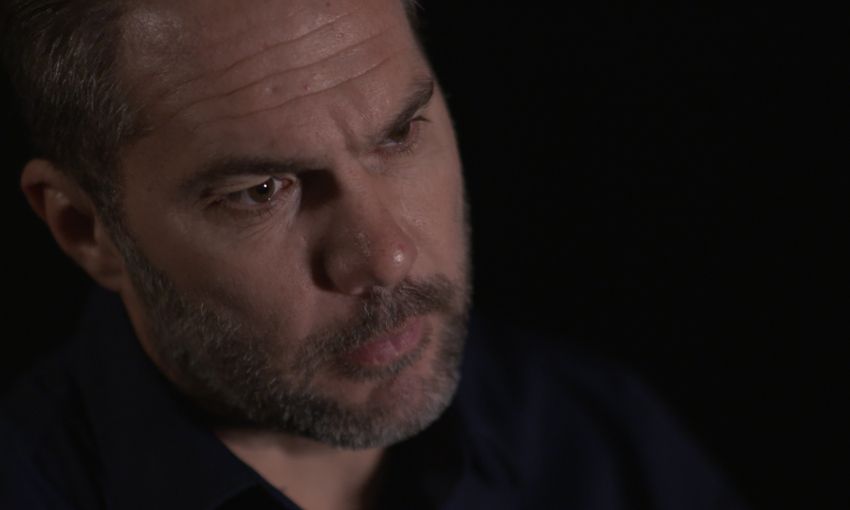Jason McAteer: Through the Storm - Watch now
To mark World Mental Health Day, LFCTV premieres Jason McAteer: Through the Storm, an exclusive documentary which examines the impact of mental health problems in football and wider society.
Former Red McAteer, who hosts the hour-long film, opens up about his own battle with depression; a spiral that gripped him upon retiring from football in 2007.
He also embarks on an emotional journey through the Liverpool FC community, from first-team stars to fans, to examine the effects of mental health problems and what can be done to help.
“It was a tough ask but it was important,” said McAteer. “Sometimes you have to hit people hard, you have to get to the emotional side of people’s feelings to make them watch and realise.”
During the documentary, McAteer visits both Liverpool’s Academy complex and Melwood to interview key staff. He sees first-hand the work being done to protect the emotional well-being of youth and first-team players.
He then meets Chris Kirkland and his wife, Leeona, at their home on Merseyside. Kirkland, who was a Liverpool player from 2001 to 2006, struggled with depression later in his playing career; particularly after departing Wigan Athletic in 2012.
McAteer also meets Peter Hughes, a passionate Kopite whose son Neil ‘Yozza’ Hughes took his own life aged 31 in 2016. Peter bravely shares poignant memories of his son and the aftermath of his passing, in the hope that his words can reach others in a similar position.
Jason McAteer: Through the Storm is available to watch on LFCTV GO and YouTube for free.
The programme will also be aired on LFCTV for the first time at 9pm BST this evening.
Please note, this documentary shares frank, personal accounts of mental health struggles experienced by players, fans and their families. It also includes content relating to suicide that viewers may find distressing.
If you have been affected by any of the issues raised in Jason McAteer: Through the Storm, the following list of organisations, drawn up by the NHS, may be able to provide help and advice.
Help and support is available right now if you need it. You don't have to struggle with difficult feelings alone.
Phone a helpline
These free helplines are there to help when you're feeling down or desperate.
Unless it says otherwise, they're open 24 hours a day, every day.
Samaritans – for everyone
Call 116 123
Text 087 2 60 90 90
Email jo@samaritans.org
Campaign Against Living Miserably (CALM) – for men
Call 0800 58 58 58 – 5pm to midnight every day
Visit the webchat page
Papyrus – for people under 35
Call 0800 068 41 41 – Monday to Friday 10am to 10pm, weekends 2pm to 10pm, bank holidays 2pm to 5pm
Text 07786 209697
Email pat@papyrus-uk.org
Childline – for children and young people under 19
Call 0800 1111 – the number won't show up on your phone bill
The Silver Line – for older people
Call 0800 4 70 80 90
Zero Suicide Alliance
ZSA is a collaborative of NHS trusts, businesses and individuals who are all committed to suicide prevention in the UK and beyond. Watch their free 20-minute suicide prevention training clip here.
Talk to someone you trust
Let family or friends know what's going on for you. They may be able to offer support and help keep you safe.
There's no right or wrong way to talk about suicidal feelings – starting the conversation is what's important.
Who else you can talk to
If you find it difficult to talk to someone you know, you could:
- call your GP – ask for an emergency appointment
- call 111 out of hours – they will help you find the support and help you need
- contact your mental health crisis team – if you have one
Important
Is your life in danger?
If you have seriously harmed yourself – for example, by taking a drug overdose – call 999 for an ambulance or go straight to A&E.
Or ask someone else to call 999 or take you to A&E.
Tips for coping right now
- try not to think about the future – just focus on getting through today
- stay away from drugs and alcohol
- get yourself to a safe place, like a friend's house
- be around other people
- do something you usually enjoy, such as spending time with a pet
See more tips from Rethink.
Worried about someone else?
If you're worried about someone, try to get them to talk to you. Ask open-ended questions like: "How do you feel about...?"
Don't worry about having the answers. Just listening to what someone has to say and taking it seriously can be more helpful.
See Samaritans' tips on how to start a difficult conversation.
Rethink also has advice on how to support someone who is having suicidal thoughts.
Survivors of Bereavement by Suicide (SOBs)
SOBs exists to meet the needs and break the isolation experienced by those bereaved by suicide. They are a self-help organisation and they aim to provide a safe, confidential environment in which bereaved people can share their experiences and feelings, so giving and gaining support from each other.
SOBs
Call 0300 111 5065



